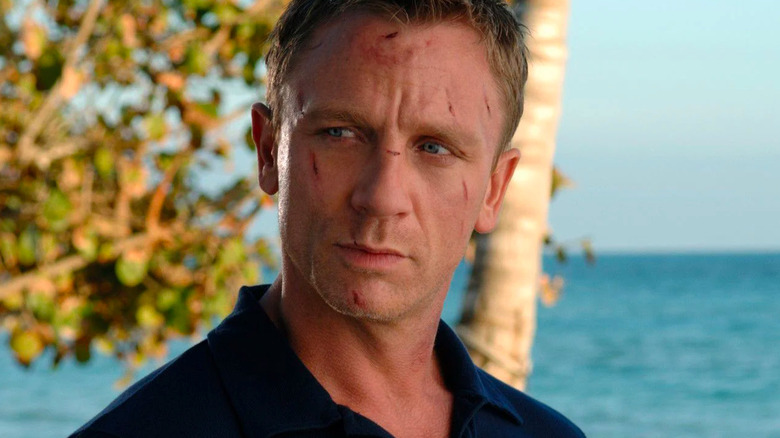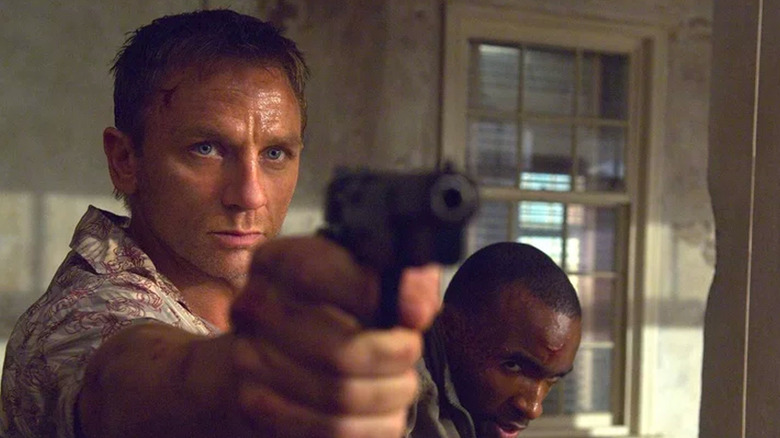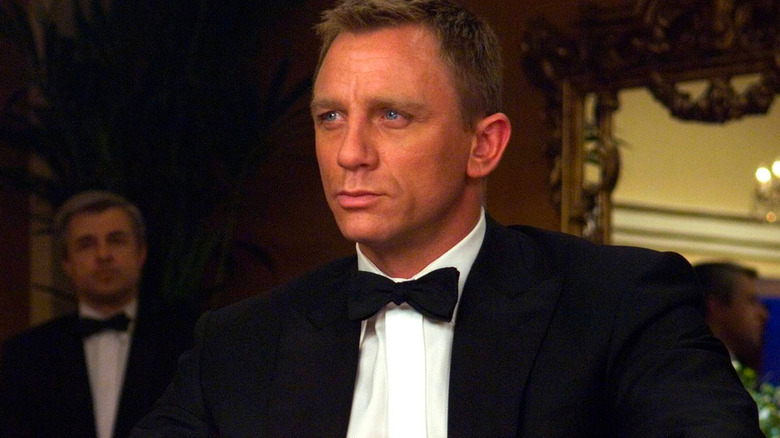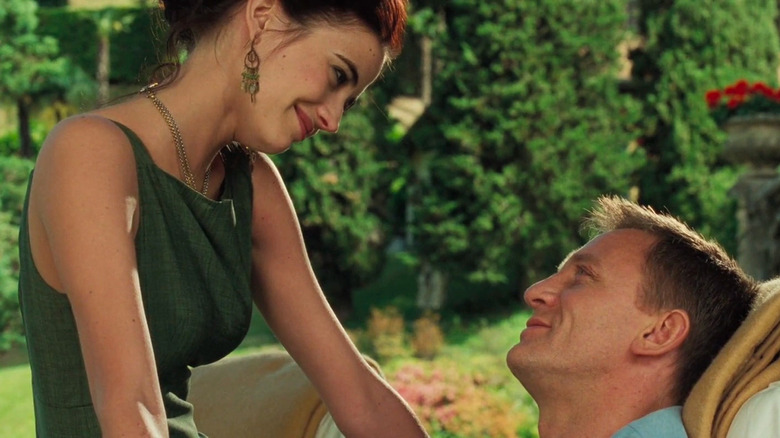Why Daniel Craig Turned Down His First Offer For Casino Royale
Martin Campbell's take on the very first James Bond novel, "Casino Royale," had major work cut out for it. The film was coming off the heels of Pierce Brosnan's final outing as the British super spy, the financially successful but ridiculous "Die Another Day." Longtime Bond producers Barbara Broccoli and Michael Wilson wanted to bring the character back to basics, to take the world seriously, and to retrofit the Bond franchise with enough grit to compete with the darker spy thrillers of the aughts. Campbell was ideal for the job: he'd directed Brosnan in the grounded "GoldenEye," so it made perfect sense to bring him back for the new Bond.
Finding the actor who'd succeed Brosnan was also a no-brainer: Broccoli and Wilson only had eyes from Daniel Craig. The producers eventually got their wish, and Craig has since become the most beloved actor to slip into the role since Sean Connery ... but it's never seemed like those feelings are mutual. Craig has always been, well, free with his opinion on Bond — the character and the franchise proper — not to mention the grueling work that goes into making each film. The actor who famously claimed he'd rather "slit his wrists" than return to Bond after "Spectre" was similarly disinterested with "Casino Royale." It took an impromptu heart-to-heart on an entirely different project to change Craig's mind.
Craig's reservations
When Craig was first cast as Bond — a figure that epitomized the "tall, dark and handsome" archetype for British dudes — there was some backlash. Okay, "some" is underselling it: Bond fans pushed back hard, starting campaigns all over the web that called for an actor in line at all with the late Ian Fleming's vision. Craig, of course, wasn't fazed by it, and he understood only too well that his looks (or his style) weren't well-suited to the Bond franchise as it stood. "As an actor, it was somewhere else, it was nothing to do with me," he told The Guardian in 2006.
That may have been true of the Bond films of old, but "Casino Royale" was designed as an answer to darker work like "The Bourne Identity" and even the series "24." That made Craig, who broke out in the bombastic "Layer Cake," suddenly the perfect candidate. Still, the actor wasn't convinced upon his first meeting with the producers. "When I got the call, it really was left-field," Craig admitted. "Honored though I was, I wasn't deeply enthusiastic."
A lot of it had to do with the project's lack of a script. That's standard fare for your average Bond project — "Tomorrow Never Dies" had to completely overhaul its story just days before principal photography — but that was a firm dealbreaker for Craig. "For me, at that stage, it was promises, promises. Unfortunately, they didn't have a script and I can't say yes without a script."
A giving script
Craig was also squeamish about committing to a franchise, knowing that it would undoubtedly take up a considerable chunk of his freedom. So what was it that eventually brought Craig around? Fittingly, the advice of another director. After walking away from "Casino Royale," Craig starred in Steven Spielberg's "Munich," a very dark, very gritty espionage thriller that the actor felt was everything Bond wasn't. Still, he couldn't really get Bond out of his head. So he spoke to his director: "I said to Steven, 'Bond isn't this kind of film.' He said, 'If the script's right and if the deal's right, do the job.'"
In 2005, the script finally came, and it went a long way in swaying Craig:
"I was honestly wanting to dislike it. It would have been an easy decision. I could have said, 'That's very nice. Good luck with it.' But it was too much. I sweated when I read the script. I thought, this is a great story, probably because it adhered to the book quite closely, and I just thought, 'You've got to be really silly not to have a think about this.'"
What appealed to Craig the most was Bond's obvious humanity in the film:
"He makes mistakes. He's vulnerable and falls in love. He's everything Bond isn't supposed to be. It appealed to me — showing him screwing up, bleeding and getting hurt — because that's the kind of actor I am, but also it works dramatically. If he's just action, action, action, and then he falls in love, the reaction's gonna be, like, 'Ah, b******t.' I wanted that progression and the script gave me that."
Better for Bond — and Bond girls
It also helped that Craig was able to make a few tweaks to Bond's more chauvinistic qualities — that, or give him an ego check or two. Craig's Bond was far removed from that of Sean Connery's, who famously dismissed his love interest in "Goldfinger" with the line, "Run along dear, man talk" and a smack on her backside. According to Craig, his Bond would likely "get a slap back" if he ever tried the same, and that's due in part to the way Bond girls have evolved since.
Craig may not have been on board with Bond at all at first, but the chance to make the character his own — and to bring his world a little closer to reality — was just enough to sway the actor for the better. His choice wasn't immediate after reading the' script: he also got some advice from Pierce Brosnan, and (endearingly) made a pros and cons list. While the cons might have racked up a bit throughout his tenure as Bond, let's hope he doesn't regret his choice too much now. And hey, at least now he's free to make as many indie projects (or quirky murder mysteries) as he wants.



